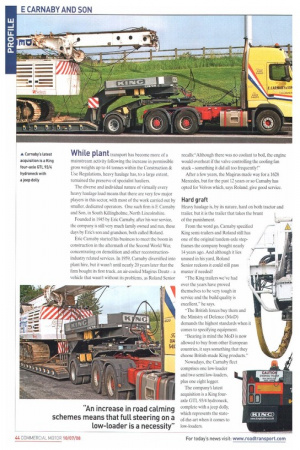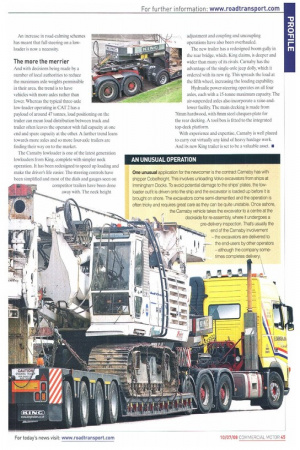W hile plant transport has become more of a mainstream activity
Page 44

Page 45

If you've noticed an error in this article please click here to report it so we can fix it.
following the increase in permissible gross weights up to 44 tonnes within the Construction & Use Regulations, heavy haulage has, to a large extent, remained the preserve of specialist hauliers.
The diverse and individual nature of virtually every heavy haulage load means that there are very few major players in this sector, with most of the work carried out by smaller, dedicated operators. One such firm is E Carnaby and Son, in South Killingholme, North Lincolnshire.
Founded in 1945 by Eric Carnaby, after his war service, the company is still very much family owned and run, these days by Eric's son and grandson, both called Roland.
Eric Carnaby started his business to meet the boom in construction in the aftermath of the Second World War, concentrating on demolition and other reconstructionindustry related services. In 1959, Carnaby diversified into plant hire, but it wasn't until nearly 20 years later that the firm bought its first truck, an air-cooled Maginis Deutz — a vehicle that wasn't without its problems, as Roland Senior recalls:"Although there was no coolant to boil, the engine would overheat if the valve controlling the cooling fan stuck — something it did all too frequently!"
After a few years, the Magirus made way for a 1628 Mercedes, but for the past 12 years or so Carnaby has opted for Volvos which, says Roland, give good service.
Hard graft
Heavy haulage is, by its nature, hard on both tractor and trailer, but it is the trailer that takes the brunt of the punishment.
From the word go, Carnaby specified — A. King semi-trailers and Roland still has one of the original tandem-axle stepframes the company bought nearly 14 years ago. And although it lies unused in his yard, Roland Senior reckons it could still pass muster if needed!
"The King trailers we've had over the years have proved themselves to be very tough in service and the build quality is excellent," he says.
"The British forces buy them and the Ministry of Defence (MoD) demands the highest standards when it comes to specifying equipment.
"Bearing in mind the MoD is now allowed to buy from other European countries, it says something that they choose British-made King products."
Nowadays, the Carnaby fleet comprises one low-loader and two semi low-loaders, plus one eight legger.
The company's latest acquisition is a King fouraxle GTL 93/4 hydroneck, complete with a jeep dolly, which represents the stateof-the-art when it comes to low-loaders. An increase in road-calming schemes has meant that full steering on a lowloader is now a necessity.
The more the merrier
And with decisions being made by a number of local authorities to reduce the maximum axle weights permissible in their area, the trend is to have vehicles with more axles rather than fewer. Whereas the typical three-axle low-loader operating in CAT 2 has a payload of around 47 tonnes, load positioning on the trailer can mean load distribution between truck and trailer often leaves the operator with full capacity at one end and spare capacity at the other. A further trend leans towards more axles and so more four-axle trailers are finding their way Onto the market.
The Carnaby lowloader is one of the latest generation lowloaders from King, complete with simpler neck operation. It has been redesigned to speed up loading and make the driver's life easier. The steering controls have been simplified and most of the dials and gauges seen on competitor trailers have been done away with. The neck height adjustment and coupling and uncoupling operations have also been overhauled.
The new trailer has a redesigned boom gully in the rear bridge, which, King claims, is deeper and wider than many of its rivals. Carnaby has the advantage of the single-axle jeep dolly, which it ordered with its new rig. This spreads the load at the fifth wheel, increasing the loading capability.
Hydraulic power-steering operates on all four axles, each with a 15-tonne maximum capacity. The air-suspended axles also incorporate a raise-andlower facility. The main decking is made from 70mm hardwood, with 8mm steel chequer-plate for the rear decking. A tool box is fitted to the integrated top-deck platform.
With experience and expertise. Carnaby is well placed to carry out virtually any kind of heavy haulage work. And its new King trailer is set to be a valuable asset.








































































































































































